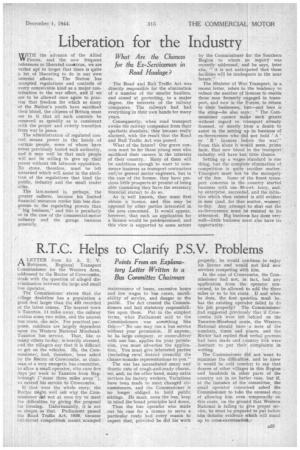R.T.C. Helps to Clarify P.S.V. Problems
Page 25

If you've noticed an error in this article please click here to report it so we can fix it.
Points From an Explanatory Letter Written to a Bus Committee Chairman
A LETTER from Sir A. T. V. .1-1 Robinson, Regional Transport Commissioner for the Western Area, addressed to the Rector of Crowcombe, deals with the question of alleged discrimination between the large and small hue operator.
The Commissioner states that the village doubtless has a population a good deal larger than the 433 recorded at the latest census. The nearest town is Taunton, 11 miles away, the railway station some two miles, and the nearest has route, dile mile. For practical purposes, residents are largely dependent upon the Western National MineheadTaunton bus service. That, like so many others to-day, is-heavily stressed, and the villagers say that it is difficult to get on the vehicles. He, the Commissioner, had, Therefore, been asked by the Rector of Crowcombe, as chairman of a very energetic bus committee, to allow a small operator, who runs five days per week to Taunton from Bagborough ("gome three miles away "), to extend his service to Crowcombe.
If that were the whole story, the Rector might well ask why the Commissioner did not at once try to meet the difficulties by giving the proposal his blessing. Unfortunately, it is not so simple as that. Parliament passed the Road Traffic Act, 1930, because cut-throat competition meant scamped maintenance of buses, excessive hours and low wages to bus crews, unreliability of service, and danger to the public. The Act created the Commissioners and laid statutory responsibilities upon them. Put in the simplest terms, what Parliament said to the Commissioners was something like this:—" No one may run a bus service without your permission. If anyone, be he large company, or owner-driver with one bus, applies for your permission, you must advertise the application, You must give interested parties (including rural district councils) the chance to,make representations to you."
The war has necessitated many and drastic cuts of rough-and-ready character, and, on the other hand, many extra services for factory workers. Variations have been made to meet changed circumstances, and the Commissioner is no longer obliged to hold public sittings. He must, none the less, keep in mind the broad principles laid down.
Thus the bus. operator who made out his case for a licence to serve a particular route had every reason to expect that, provided he did his work properly, he would continue to enjoy his licence and would not find new services competing with him.
In the case of Crowcombe, the Commissioner had not, in fact, had any application from the operator concerned, to be allowed to add the three miles or so to his route. If and when he does, the first question limit be, has the existing operator failed to do his job properly? The Commissioner ,had suggested previously that if Crowcombe folk were left behind on the Taunton-Minehead route, the Western National should have a note of the numberS, times and places, and the Rector had replied that verbal protests had been made and country folk were hesitant to put their complaints in writing.
The Commissioner did not Want to minimize the difficulties, and he knew it would be cold comfort to say that dozens of other villages in this Region and hundreds in other parts of the country are in no better case, but if, at the instance of the committee, the small operator concerned asked the Commissioner to take the unusual step of allowing him even temporarily on this route, on the ground that Western National is failing to give proper service, he must be prepared to put before him definite evidence which will stand up to cross-examination,




















































